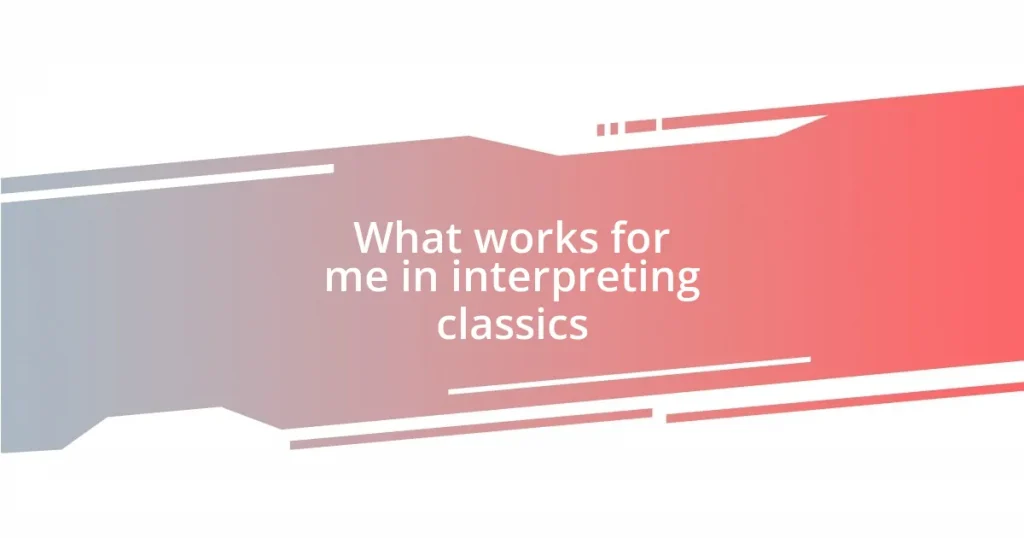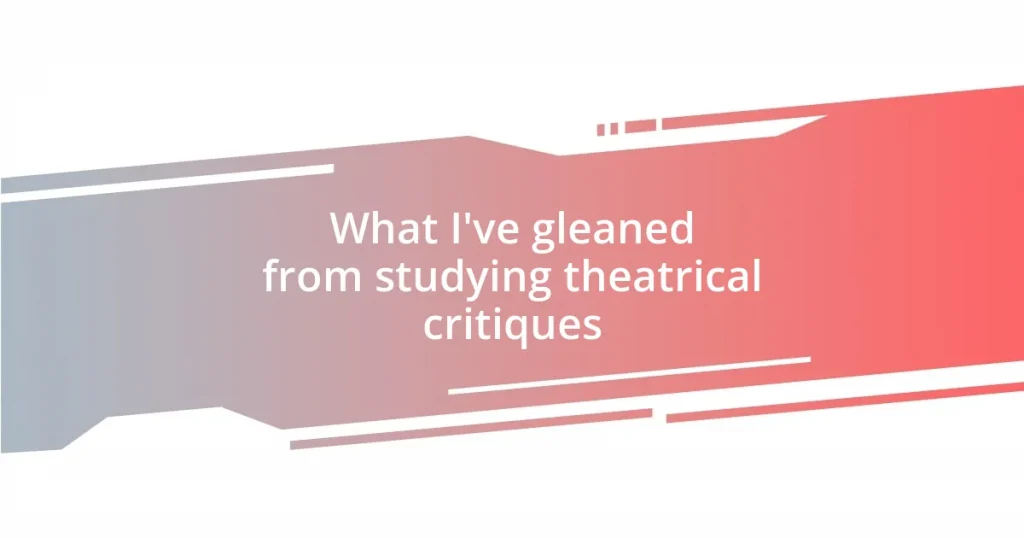Key takeaways:
- Performance anxiety can manifest through physical and emotional symptoms, causing self-doubt and fear of judgment.
- Common causes include past failures, perfectionism, and high-stakes pressure, which amplify feelings of inadequacy.
- Effective management techniques include deep breathing, visualization, and thorough preparation, which can help shift mindset towards positivity.
- Seeking professional help, such as therapy or support groups, can provide valuable coping strategies and a sense of community.

Understanding performance anxiety
Performance anxiety is a complex experience that many of us face, often feeling like a weight pressing down just before we step into the spotlight. I remember once preparing for a presentation I had worked hard on, only to find myself paralyzed by fear as I uncomfortably stared at the audience. Have you ever felt your heart racing and palms sweating at the thought of performing in front of others? That visceral reaction is a hallmark of performance anxiety.
It’s fascinating how this anxiety can stem from various places—past experiences, fear of judgment, or simply the pressure to succeed. I can vividly recall a time when I choked during a music recital, haunted by the fear of disappointing my teacher and peers. It’s a feeling that can linger, shaping our confidence in similar situations later on. What if we could shift our perception and view these moments as opportunities for growth instead of threats?
Many individuals experience this anxiety on different scales, whether it’s in sports, public speaking, or even everyday social interactions. I’ve often wondered why we allow the fear of failure to dictate our actions. When I shifted my mindset, focusing on the excitement of sharing my passion rather than worrying about perfection, I found the pressure less suffocating. Isn’t it worth exploring how reframing our thoughts could diminish the grip of performance anxiety?

Symptoms of performance anxiety
It’s striking how performance anxiety can manifest in both physical and emotional symptoms. Personally, I’ve felt that telltale knot in my stomach, a sensation so intense that it distracts from my thoughts. This physical discomfort often mirrors my racing heart and shallow breathing, creating a cycle of anxiety that’s hard to break. Can you relate to feeling so anxious that you forget your lines or lose your train of thought?
Alongside these physical signs, there’s a heavy emotional toll. I remember a time when I faced a panel interview, and I couldn’t shake the feeling of impending doom. The fear of making mistakes played out in my mind, overshadowing my preparation and confidence. This emotional upheaval often leads to intense self-doubt, making it challenging to perform to our true potential. Have you ever found yourself replaying negative thoughts about how you’d perform in a given situation? It’s a familiar struggle.
In my observation, the symptoms of performance anxiety vary widely among individuals. Some experience excessive sweating or trembling, while others may notice a tightness in their throat or a sudden urge to escape the situation altogether. Reflecting on past performances, I’ve witness how the fear can sometimes go unnoticed until it’s too late, becoming an unwelcome companion at crucial moments. Recognizing these signs is the first step in managing this anxiety.
| Physical Symptoms | Emotional Symptoms |
|---|---|
| Increased heart rate | Self-doubt |
| Sweating | Fear of judgment |
| Trembling | Stress or panic |
| Dry mouth | Feeling overwhelmed |

Causes of performance anxiety
Understanding the causes of performance anxiety uncovers a variety of underlying factors. I think back to my early days of public speaking. Fear was often rooted in previous negative experiences or the haunting memory of blanking out mid-sentence. The critical voices of peers and even our inner critic can amplify feelings of inadequacy, creating a perfect storm of anxiety the moment we have to perform.
Here are some common causes that many of us experience:
- Past failures: A traumatic experience, like forgetting a line in a play, can make future performances feel daunting.
- Fear of judgment: Concerns about what others will think can cloud our confidence and focus.
- High stakes pressure: The need to excel, whether in academics or sports, can escalate anxiety levels.
- Perfectionism: Striving for an unattainable ideal often leads to paralyzing fear of inadequacy.
- Social comparison: Seeing others perform well can heighten our self-doubt and anxiety.
Sometimes, in my own life, I’ve found that a simple change in the stakes can help mitigate this anxiety. For instance, viewing a presentation as a shared conversation rather than a test can transform that anxiety into excitement. This perspective shift doesn’t erase anxiety completely, but it sure helps in navigating those turbulent waters.

Techniques to manage anxiety
One effective technique I’ve found for managing performance anxiety is deep breathing. Whenever I feel that familiar tightness in my chest, taking a moment to inhale deeply and exhale slowly can feel like a mini reset. Not only does this help calm my racing heart, but it also brings my focus back to the present moment. Have you ever tried it? It’s amazing how something so simple can create a sense of control amid chaos.
Visualization is another powerful tool I swear by. Before an important event, I envision myself succeeding, standing tall and confident, as if I’m plucking those negative thoughts out of the air. This mental rehearsal doesn’t just boost my morale; it also rewires my brain to associate performance with positivity rather than fear. Have you ever thought about what it might look like to ace a presentation or a big game? This practice can be a game changer in shifting your mindset.
Lastly, I can’t emphasize the importance of preparation enough. In my experience, thorough practice can reduce anxiety significantly. When I feel ready, I’m less likely to be consumed by fear of failure. For instance, before a big speech, I make it a point to rehearse multiple times and even seek feedback from friends. They often provide insights I wouldn’t have considered, further boosting my confidence. Have you prepared in a similar way before crucial moments? The comfort that comes from being well-prepared can indeed turn anxiety into anticipation.

Strategies for overcoming performance fear
One strategy that has transformed my approach to performance fear is embracing the concept of “exposure therapy.” Early on, I created opportunities for myself to face my fears in smaller, manageable settings. For instance, I started by sharing my ideas in intimate group discussions, gradually progressing to larger audiences. Could you see yourself starting this way? Each small victory built my confidence and made those larger challenges feel less daunting.
Another powerful tool I utilize is positive affirmations. I remember standing in front of the mirror on days leading up to a key presentation, repeating phrases like, “I am capable” and “I will succeed.” This practice may sound simple, but it infused me with a sense of empowerment and readiness. Have you ever considered how words can shape your mindset? Shifting our self-talk from doubt to encouragement can create a profound impact on how we perceive our performance.
Moreover, I find it incredibly helpful to foster a supportive community. Surrounding myself with people who understand the intricacies of performance anxiety has made a world of difference. Sharing experiences and hearing others’ strategies often lightens the burden. Think about your own circle—who can you reach out to for encouragement? Building connections with like-minded individuals creates a network of reassurance, making it easier to navigate those moments of fear together.

Seeking professional help
Seeking professional help can be a crucial step for many grappling with performance anxiety. I remember when I finally decided to see a therapist specializing in anxiety management. It wasn’t easy to take that first step, but I quickly realized how beneficial it was to talk through my fears with someone who understood the intricacies of performance anxiety. Have you ever felt that relief of sharing your burden with another person? It can be incredibly freeing.
Working alongside a professional opened my eyes to new coping strategies that I hadn’t considered before. For instance, my therapist introduced me to Cognitive Behavioral Therapy (CBT), which helped me identify and challenge negative thought patterns. This approach not only changed how I viewed my performance but also instilled a sense of control over my anxiety. Have you thought about how the right tools can transform your experience? I know that for me, those new perspectives were eye-opening.
Additionally, joining a support group facilitated by a mental health professional provided further validation and camaraderie. Listening to others share their stories reminded me that I wasn’t alone in this struggle. There’s something so powerful about knowing that others are navigating similar experiences, isn’t there? By seeking help, I not only gained insights but also formed connections that have sustained me through my journey of overcoming performance anxiety.















